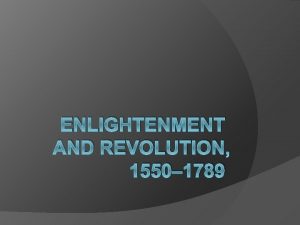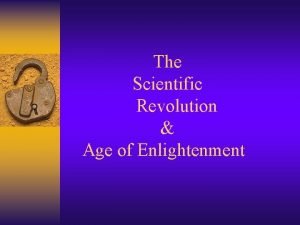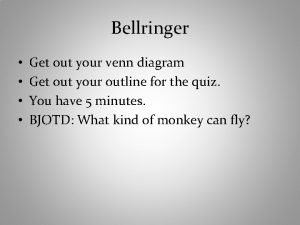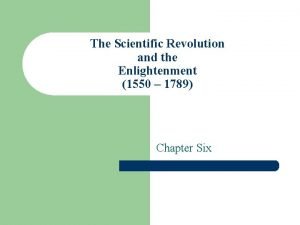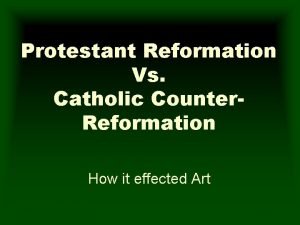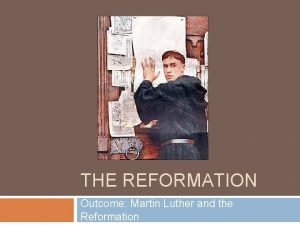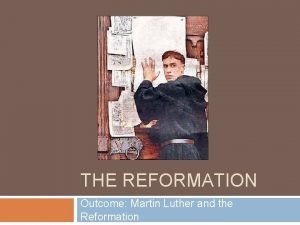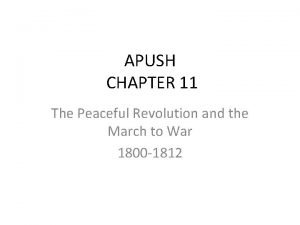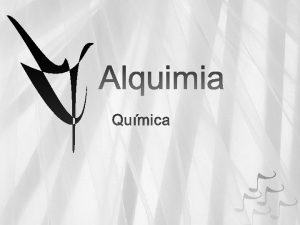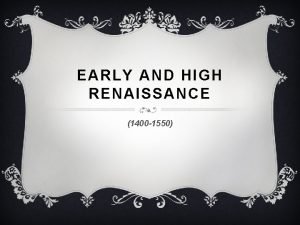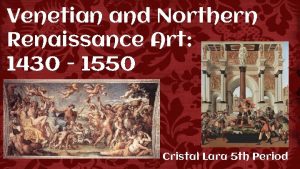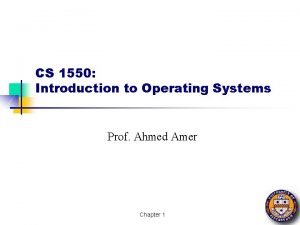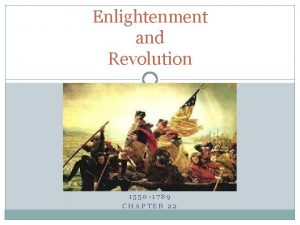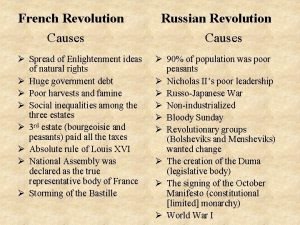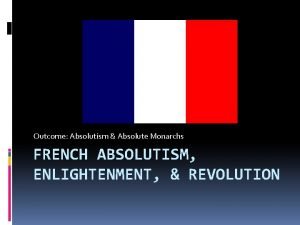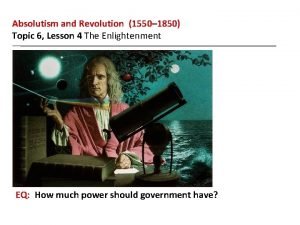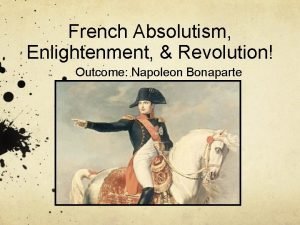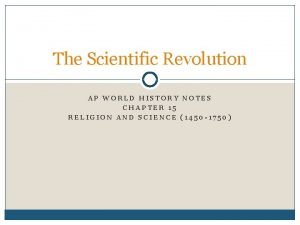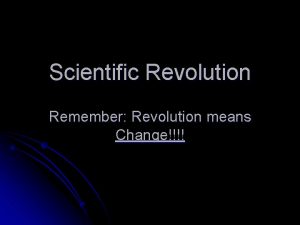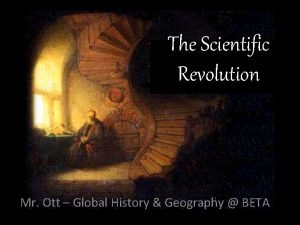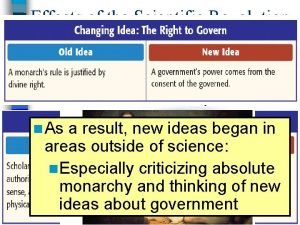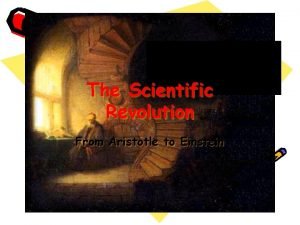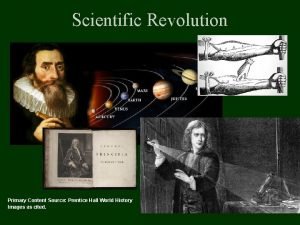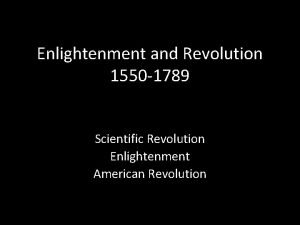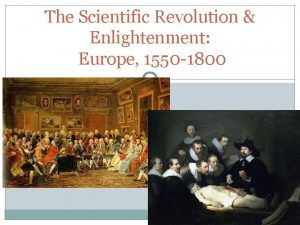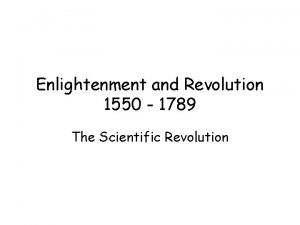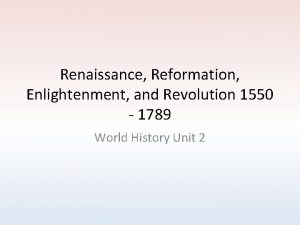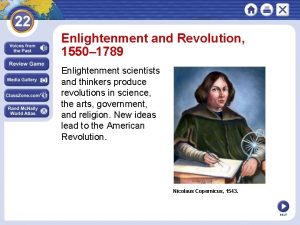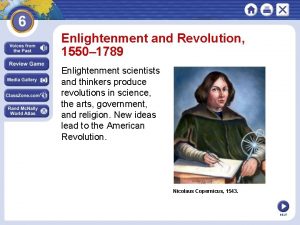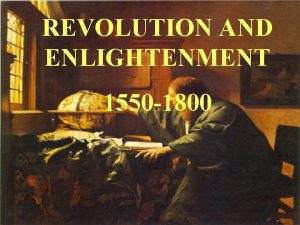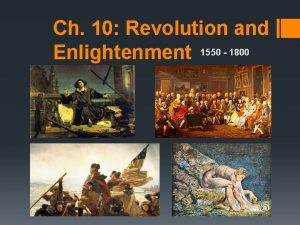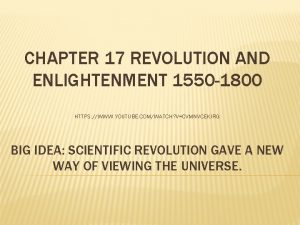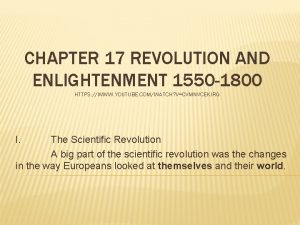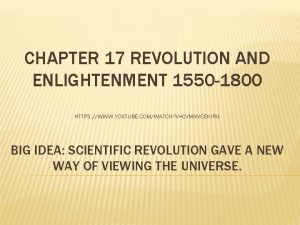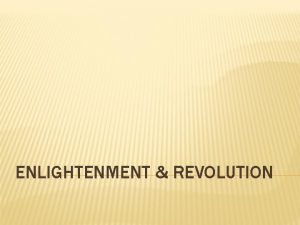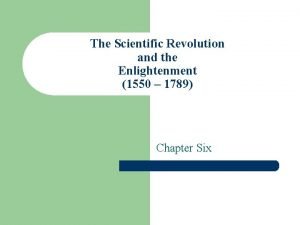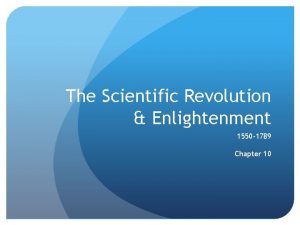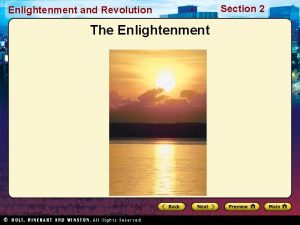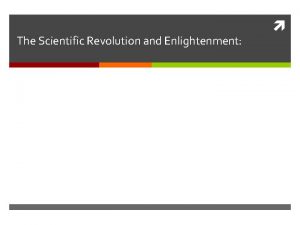SCIENTIFIC REVOLUTION THE ENLIGHTENMENT 1550 1800 Reformation to































- Slides: 31

SCIENTIFIC REVOLUTION & THE ENLIGHTENMENT 1550 - 1800 Reformation to Revolution

Prior view of the Universe: PTOLEMAIC SYSTEM The Universe Aristotle and Ptolemy, Alexandria, 150 AD Aka Geocentric system • The EARTH is stationary & at center of the Universe • Sun, moon, planets, & stars revolve around Earth in complicated orbits

COPERNICAN SYSTEM The Universe Nicolaus Copernicus, Poland, 1543 Aka Heliocentric system • The SUN is stationary & at center of the Universe • The Earth & other planets rotate around the Sun, the Moon rotates around the Earth, and the stars do not move


COPERNICAN SYSTEM cont. The Universe Johannes Kepler, Germany, 1605 Laws of Planetary Motion ① The Law of Orbits: All planets move in elliptical orbits, with the sun at one focus. ① The Law of Areas: A line that connects a planet to the sun sweeps out equal areas in equal times ① The Law of Periods: The square of the period of any planet is proportional to the cube of the semi-major axis of its orbit.

Galileo Galilei, Italy, 1610 The Universe Galileo Galilei “The father of modern science” • Discoveries in physics, astronomy, cosmology, mathematics, & philosophy • Planetary matter • 4 moons of Jupiter • sunspots • Advocate of heliocentric universe • The Roman Inquisition, 1633

Primary source analysis: Galileo Discovers the Moons of Jupiter (1610) Galileo Galilei One of the hallmarks of the Scientific Revolution was the establishment of the scientific method of inquiry. • How does Galileo's notebook description of his observations help to establish the scientific method? • How does Galileo's discovery challenge existing scientific and religious beliefs?

ISAAC NEWTON, England, 1686 The Universe Isaac Newton • Principia, 1686 • Laws of Motion • Law of Universal Gravitation • Natural Law • Validates Heliocentric model

SCIENTIFIC METHOD Francis Bacon, England, 1620 • the Royal Society of London for Improving Natural Knowledge

Other important intellectuals of the Scientific Revolution: Margaret Cavendish - pioneer female scientific writer Robert Boyle – experimental method & Royal Society Antoine Lavoisier – father of modern chemistry Andreas Vesalius – founder of modern human anatomy Rene Descartes – mathematician, natural scientist, & metaphycisist • William Harvey – 1 st to describe blood circulation • Maria Winkelmann – astronomer & mathematician • • •

What do you think this quote is trying to say? Why do you think it is important? What belief system(s) might it represent and/or replace?

1. “Mathematics is the language in which God has written the universe. ” - Galileo 2. “Facts which at first seem improbable will, even on scant explanation, drop the cloak which has hidden them and stand forth in naked and simple beauty. ” - Galileo 3. “If I have seen further than others, it is by standing upon the shoulders of giants. ” - Isaac Newton

4. “The improvement of understanding is for two ends: first, our own increase of knowledge; secondly, to enable us to deliver that knowledge unto others. ” - John Locke 5. “New opinions are always suspected, and usually opposed, without any reason but because they are not already common. ” - John Locke 6. “I do not agree with a word you say, but I will defend to the death your right to say it. ” - Voltaire 7. “There are three principal means of acquiring knowledge: observation of nature, reflection, and experimentation. Observations collect facts; reflection combines them; experimentation verifies the result of that combination. ” - Denis Diderot

THE ENLIGHTENMENT “The Age of Reason” Words of the World 18 th century Intellectuals used the ideas of the Scientific Revolution to reexamine all aspects of life

For the men of the Enlightenment the basic question of the age was: how does one make mankind happy and rational and free? Their basic answer was: by discovering the underlying laws which would organize all knowledge into a clear, rational system, enabling individuals to become enlightened, and the societies in which they live to progress.

Thomas Hobbes (1588 -1679) Leviathan, 1651 “The Matter, Forme and Power of a Common Wealth Ecclesiasticall and Civil “ • Natural evolution of social contract - People exchange freedoms for protection of organized society • Supports rule by absolute monarch Bellum omnium contra omnes “the war of all against all” BEST KNOWN FOR: Thomas Hobbes, an English philosopher in the 17 th century, was best known for his book Leviathan (1651) and his political views on society.

John Locke (1632 - 1704) Two Treatises of Government, 1689 • Natural rights of man • Social contract LIFE, LIBERTY, & PROPERTY Supported limited government that protected peoples’ natural rights, and the right to revolution If that social contract is broken by a government. BEST KNOWN FOR: English philosopher John Locke's works lie at the foundation of modern philosophical empiricism and political liberalism.

PRIMARY SOURCE ANALYSIS: Hobbes V. Locke Why would the basic nature of humans be a topic of discussion? Why would this be important for developing a concept for an ideal form of government? How would these writers have come up with their point of view?

THE PHILOSOPHES “one who applies himself to the study of society with the purpose of making his kind better and happier. ”

Montesquieu (1689 -1755) Full name: Charles-Louis de Secondat, Baron de La Brède and de Montesquieu The Spirit of Laws, 1748 • Separation of Powers & Check and Balance system - branches of government: Judicial, Legislative, & Executive "The political liberty of the subject is a tranquillity of mind, arising from the opinion each person has of his safety. In order to have this liberty, it is requisite the government be so constituted as one man need not be afraid of another. " BEST KNOWN FOR: French philosopher Montesquieu, was a highly influential political thinker during the Age of Enlightenment.

Voltaire (1694 -1778) Full name: François-Marie Arouet Candide, 1759 Satirical novella about the French government Dictionnaire Philosophique, 1764 encyclopedic dictionary embracing the concepts of Enlightenment and rejecting the ideas of the Roman Catholic Church. "A witty saying proves nothing. " BEST KNOWN FOR Author Voltaire wrote the satirical novella Candide and, despite controversy during his lifetime, is widely considered one of France's greatest Enlightenment writers.

Jean-Jacques Rousseau (1712 -1778) Discourse on the origins of Inequality of Mankind, 1754 • People adopt laws & government to protect private property, and in turn become enslaved to the government The Social Contract, 1762 • A government is legitimate only if it is guided by the General Will of its members • Attempted reconciliation of the freedom of individuals with the authority of the state Emile, 1762 “On the education of the natural man” • Foster children’s natural instincts BEST KNOWN FOR: Jean-Jacques Rousseau is best known as an influential 18 th-century philosopher who wrote the acclaimed work A Discourse on the Arts and Sciences.

Denis Diderot (1713 -1784) Encyclopédie, 1751 -1772 Aka Classified Dictionary of Sciences, Arts, and Trades 28 -volume collection of knowledge from leading authors & experts • Signature publication of the time period • Spread Enlightenment ideas • Weapon against old society “to change the general way of thinking” BEST KNOWN FOR: French philosopher & writer, responsible for the Encyclopédie, one of the principal works of the Enlightenment

the structure of the Encyclopédie organized information in three main branches: memory, reason, & imagination

THE PHYSIOCRATS “if individuals were free to pursue their own economic self-interest, all society would benefit”

Adam Smith (1723 -1790) “The father of capitalism” The Wealth of Nations, 1776 • Laissez-Faire Economics • 3 basic roles of government: ① Protect society from invasion ② Defend citizens from injustice ③ Keep up certain public works that individuals cannot afford but which are necessary for social interaction & trade “No society can surely be happy, of which the far greater part of the members are poor and miserable” BEST KNOWN FOR Scottish social philosopher and political economist Adam Smith wrote The Wealth of Nations and achieved the first comprehensive system of political economy.

ENLIGHTENED ABSOLUTISM Enlightened Rulers must: • Allow religious toleration • Allow freedom of speech & the press • Allow rights of private property • Nurture arts, sciences, & education • Obey the laws & enforce them fairly for all subjects PRUSSIA - Frederick II aka “Frederick the Great” AUSTRIAN EMPIRE - Maria Theresa & Joseph II RUSSIA – Catherine II aka “Catherine the Great” *Balance of Power*

The Seven Years’ War, 1756 -1763 aka The Great War for Empire aka The French & Indian War Crash Course War of Alliances Original rivalry: • France V Austria Diplomatic Revolution of 1756: • France, Austria, Russia V England, Prussia EUROPE – all lands returned except Prussia controls Silesia INDIA – French withdraw & British control India NORTH AMERICA – Canada: French -> British Florida: Spanish -> British Louisiana: French -> Spanish * Britain = world’s greatest colonial power

ENLIGHTENMENT IN THE ARTS Art & architecture • Rococo Literature • Magazine & newspapers Music • Bach • Handel • Haydn • Mozart Handel’s Messiah Mozart’s Marriage of Figaro

The Declaration of Independence 1776 Why is the Declaration of Independence considered to be a product of Enlightenment thinking? “We hold these truths to be self-evident, that all men are created equal; that they are endowed by their creator with certain inalienable rights; that among these are life, liberty, and the pursuit of happiness. ”

REVIEW: Scientific Revolution & Enlightenment
 How did the reformation help spur the scientific revolution
How did the reformation help spur the scientific revolution Scientific revolution and enlightenment speed dating
Scientific revolution and enlightenment speed dating Scientific revolution and enlightenment speed dating
Scientific revolution and enlightenment speed dating Enlightenment vs scientific revolution
Enlightenment vs scientific revolution Divine rights of kings
Divine rights of kings Catholic reformation vs counter reformation
Catholic reformation vs counter reformation The reformation outcome martin luther and the reformation
The reformation outcome martin luther and the reformation The reformation outcome: martin luther and the reformation
The reformation outcome: martin luther and the reformation Peaceful coexistence apush
Peaceful coexistence apush Tlm 1550
Tlm 1550 Alquimia. (300 antes de c a 1500 después de c).
Alquimia. (300 antes de c a 1500 después de c). Early and high renaissance (1400–1550)
Early and high renaissance (1400–1550) Venetian and northern renaissance (1430–1550)
Venetian and northern renaissance (1430–1550) Cs 1550
Cs 1550 French absolutism enlightenment & revolution
French absolutism enlightenment & revolution Chapter 22 building vocabulary enlightenment and revolution
Chapter 22 building vocabulary enlightenment and revolution Enlightenment ideas
Enlightenment ideas What is absolutism
What is absolutism Absolutism and revolution lesson 4 the enlightenment
Absolutism and revolution lesson 4 the enlightenment French absolutism enlightenment & revolution
French absolutism enlightenment & revolution French absolutism enlightenment & revolution
French absolutism enlightenment & revolution How could the french revolution been avoided
How could the french revolution been avoided Green revolution vs third agricultural revolution
Green revolution vs third agricultural revolution Russian revolution vs french revolution
Russian revolution vs french revolution Scientific revolution ap world history
Scientific revolution ap world history Whats the scientific revolution
Whats the scientific revolution Scientific revolution effects on society
Scientific revolution effects on society What were the effects of the scientific revolution?
What were the effects of the scientific revolution? Jupiter's moons
Jupiter's moons Newton's first law of motion
Newton's first law of motion Scientific revolution primary sources
Scientific revolution primary sources What did isaac newton do in the scientific revolution
What did isaac newton do in the scientific revolution
